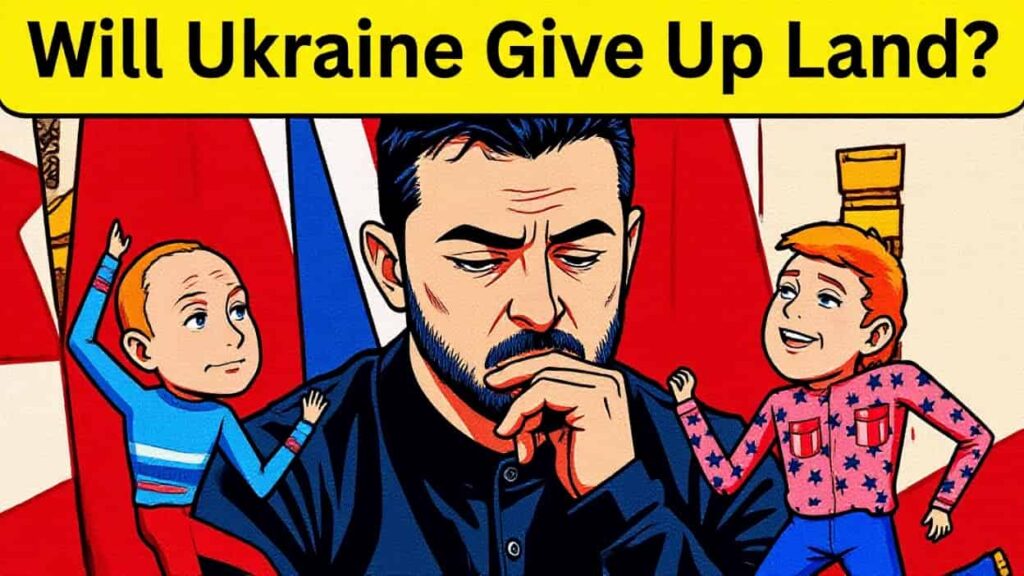As the war between Russia and Ukraine grinds into its third year, one of the most pressing questions dominating global headlines is whether President Volodymyr Zelensky will consider the unthinkable: Zelensky trade territory for peace.
The possibility is sparking intense debate among diplomats, military strategists, and ordinary citizens, with consequences that could reshape Europe’s geopolitical landscape for decades.
Table of Contents
The Growing Pressure on Ukraine
Ukraine’s counteroffensives in 2022 and 2023 reclaimed significant ground, but Russia still controls about 18% of Ukrainian territory, including Crimea and parts of the Donbas region. With mounting casualties, economic strain, and wavering Western support, pressure is increasing on Kyiv to negotiate a settlement.
International observers argue that peace talks will inevitably touch on territorial concessions. The phrase “Zelensky trade territory for peace” has become a focal point in discussions among analysts who believe prolonged fighting risks further destabilizing Eastern Europe.
Western Allies and Their Dilemma

The United States and European Union remain Ukraine’s strongest backers, but political divisions are widening. Some Western leaders insist that Ukraine must decide its own path, while others quietly push for compromise. A leaked EU memo revealed concerns that “a frozen conflict may be preferable to a war without end.”
Former U.S. officials have warned that the West’s appetite for long-term financial and military aid is not unlimited. This has raised the possibility that Zelensky could be nudged toward negotiations where “Zelensky trade territory for peace” is no longer a hypothetical, but a serious proposal.
Zelensky’s Stance on Territorial Concessions
So far, Zelensky has categorically rejected any deal that involves ceding Ukrainian land. In his words:
“Ukraine will not trade its people, its sovereignty, or its territory for peace.”
Yet, critics argue that such a firm stance could prolong the war, costing more lives and resources. Supporters, however, counter that accepting a deal would legitimize Russia’s aggression and encourage similar invasions elsewhere.
The question remains: Will Zelensky trade territory for peace under overwhelming international and domestic pressure?
Strategic and Geopolitical Implications
If Ukraine concedes territory, it would mark one of the most dramatic shifts in modern European history. Such a move could embolden Moscow, weaken NATO’s deterrence credibility, and alter the balance of power in the region.
On the other hand, proponents argue that negotiating peace—possibly involving concessions—could spare Ukraine further devastation and allow for rebuilding. For many, the debate over whether Zelensky trade territory for peace underscores a deeper struggle between ideals and survival.
Global Reactions
- Russia: Kremlin officials insist that Ukraine must accept “new realities” on the ground, implying territorial recognition.
- NATO: Alliance members remain divided, balancing military commitments with fears of escalation.
- Public Opinion: In Ukraine, polls show a majority rejecting territorial trade-offs, but fatigue with the war is growing.
The phrase “Zelensky trade territory for peace” is now at the heart of public discourse across Europe and the U.S.
FAQ Section
Why won’t Zelensky trade territory for peace?
Zelensky believes territorial concessions would betray Ukraine’s sovereignty, dishonor sacrifices made by citizens, and embolden Russia.
Has Ukraine ever considered territorial compromise before?
Yes, past discussions around Crimea and Donbas included proposals for special status, but these were rejected by both sides.
Would territorial compromise guarantee peace?
No. Experts warn Russia could see it as a temporary truce, regroup, and launch new offensives later.
How do Ukrainians feel about the issue?
Polls show most Ukrainians oppose giving up territory, though opinions shift as the war drags on.
What role does the West play in this decision?
Western military and financial aid is crucial. If it weakens, Ukraine may face pressure to negotiate from a weaker position.
Conclusion
The question—Will Zelensky trade territory for peace?—is more than a political dilemma. It reflects the clash between ideals and realities, between sovereignty and survival.
For now, Zelensky remains steadfast in defending every inch of Ukraine. But as the war grinds on, pressure from both allies and circumstances may force him into the hardest decision of his presidency.
Whether Ukraine chooses total resistance or pragmatic compromise, the consequences will shape not only its future but also the entire global order.
👉 For more in-depth coverage and detailed analysis, visit Documentary Times.